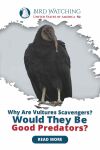
What’s This Post About?
Scavengers are not the first thing that comes to mind when considering the beauty of nature. However, scavengers eliminate corpses from the environment by eating them, which is known as carrion. This is a crucial function that extends far beyond natural aesthetics.
Vultures skip the exercise of chasing and killing an animal. Instead, they wait for someone else to do the hard work, and once they leave, they move in to consume the carcasses. So the real question is, why are they scavengers? Are they incapable of hunting and attacking an animal?
Vultures, in essence, play an essential role as scavengers in the ecosystem. They live on dead animals whom they detect through their heightened sense of smell and sight. In addition, their bodies are built in a way that helps them scavenge and makes attacking alive animals difficult.

Why Are Vultures Scavengers?
Vultures have the safest food supply on the planet. A vulture in good health will never stay hungry; there will always be dead animals around!

Vultures are highly specialized birds that thrive on eating dead animals. This is because their biological structure, physical features, and skillset enable them to devour carcasses. In addition, they have a knack for locating deceased animals either by smell or sight.
Digestive System
Vultures’ mouths and huge intestines are loaded with bacteria that would make most other animals ill, but these birds have developed a solid stomach to keep them from becoming sick when eating rotting meat.
Bacteria emit poisonous compounds when a corpse decomposes, making the carcass a dangerous diet for most animals. On the other hand, Vultures frequently wait for rot to set in before attacking dead animals with thick skins.
Furthermore, vultures may frequently pick at a deceased animal’s anus to obtain the inner contents. Vultures may eat toxic bacteria and rotten excrement, but they appear immune to these harmful microorganisms.
Vultures develop a solid digestive system that destroys the bulk of the harmful germs they consume. They also appear to have acquired tolerance for some of the dangerous bacteria types that would kill other species that seem to thrive in the lower gut of vultures.
Hairless Head

They have a few more traits that aid them in their endeavor. You’ve undoubtedly heard that they don’t have feathers on their heads, so they may easily poke their heads into the dead animal without fear of getting their plumage soiled. That way, they remain clean. External dirt is washed away by the sun and rain.
They also have the means to clean their feet, which are constantly filthy. Ironically their way of cleaning them is that they urinate on their feet daily. The uric acid is so powerful that it eliminates anything on their legs. All of these factors help individuals stay healthy no matter what they consume.
DID YOU KNOW?
The vulture's hairless head also helps it keep cool and control body temperature.
Role in the Natural Ecosystem

Vultures are scavengers because, like all organisms, they also have a role to play in the natural ecosystem. In addition, they are some of nature’s most efficient garbage recyclers; as a result, they are beneficial to the environment in general.
Vultures are frequently seen near settlements because people generate a steady and consistent supply of food. Garbage, roadkill, and animal rearing are all excellent sources of food for vultures. Our roadways would be filled with carcasses if vultures didn’t exist.
How Do Vultures Scavenge?

They utilize a variety of talents to scan the environment for food after they reach operating height. They have an excellent vision that helps them spot dead animals from miles away. Some vultures, like turkey vultures, rely on their smelling abilities, discovering carcasses covered with mounds of leaves.
When a potential meal is discovered by odor or sight, the bird flies in smaller, lower circles until it receives either scent or visual confirmation of the food. Thus, even though everything appears to be in order, it doesn’t immediately start feasting.
DID YOU KNOW?
Vultures are said to be able to see a 3-foot corpse on the vast fields from four kilometers away.
Carnivores that kill prey follow a set pattern. They kill, eat till they are full, go to sleep, but sleep close enough to keep thieves at bay. As a result, vultures are hesitant and take their time hovering, examining, and sniffing the meal.
Here are a few of the essential skillsets that a vulture possesses for them to be scavengers.
Long Flights

They are highly efficient fliers, covering great distances with minimal muscular and respiratory exertion. Their minds are designed to “adjust” the location of their wings, even specific flying feathers, to provide the most lift with the least amount of muscular activity.
Flying Pattern
Turkey Vultures start circling in the distance when they sense food. That alerts the other vultures to the possibility of a meal underneath their distant companion. This frequently leads to a spiraling formation of two or more vultures orbiting over the potential food source.
DID YOU KNOW?
This orbiting structure is a "kettle" that might be used for eating or social functions.
Sense of Smell

Unlike most birds, turkey vultures have exceptional sniffing ability. This allows them to locate a reasonably fresh body even when it is hidden from above by foliage. Then, after discovering it, they make sure that whatever killed it isn’t ready to murder any freeloaders when they smell something.
All of this is done by committing to the most common vulture flying pattern, which involves vultures orbiting in what are known as “gyres”. When the bird is seeking, these rings broaden and rise, and when food is detected, they tighten and fall.
Sense of Sight
Sense of sight, while common in most birds, helps the vultures detect food from miles away. Black Vultures consume carrion by flying high in the sky. They can identify corpses from this high above. They also keep a watch on Turkey Vultures, who have a better-developed sense of smell, and follow them to food.
DID YOU KNOW?
Black Vultures congregate in large groups around corpses, often displacing Turkey Vultures of the meal.
Scavengers vs. Predators

Before we see if vultures can be good predators, we must understand the difference between the two. Predators are animals that chase and kill other animals, also known as their prey, to consume them. On the other hand, scavengers are animals that feed on dead animals. These animals can either be killed by other animals, humans, or other causes.
Almost all predatory scavengers larger than insects will hunt if there are not enough carcasses present. Unfortunately, only a few environments supply enough animal carcasses all the time to keep scavengers satisfied. That being said, just because they can kill animals does not mean that they can kill any animal. Their body’s abilities still limit them in many ways.
Can Vultures Be Good Predators?
Vultures can fly over tens of thousands of living animals and yet come up empty-handed. This is because they are not made to attack and kill.

Generally, vultures locate an animal that has been killed by a predator or by humans. They are not built the same way as natural predators in terms of their speed and talons. While there are instances where they can become predators, their skillset provides a few reservations.
Vultures wait till another animal kills their prey, and then they move in to consume it. There are, however, some instances when vultures can become predators. First is when they are very distressed by winter starvation, they will occasionally murder small animals. Vultures may also kill animals that are injured or sick. In short, situations that do not require intense chasing or battling with live animals.
Needless to say, vultures do not ‘hunt’ for food in the same way that hawks or eagles do. Their abilities are focused on discovering rather than killing. Therefore, despite playing a vital role in the ecosystem, they will not make good predators. They are better suited as scavengers.
Talons

The image in fictional books and movies has made people believe that vultures are animals with sharp talons. While the animal itself may be scary-looking, its feet are no different from that of chickens. The claws aren’t sharp, they’re not long, and they’re not powerful.
The vulture cannot be a good predator because its talon does not catch animals with it. It goes without saying that this is one of the essential features required. Without catching or grabbing the animal it wants to eat, there is no way the vulture will be able to consume it.
These talons are only used by the bird for walking and not as weapons. However, these talons help it balance and walk better than any larger predator birds like osprey.
Beak

Long, large, pointed, and powerful beaks. They use them to dismember huge dead creatures such as wolves, lions, and elephants. But, unfortunately, a great beak is not enough for the bird to become a good predator.
A vulture can’t hunt live prey because they would have to use their feet for that purpose which is impossible because of how their talons are built. That is something that isn’t going to happen.
Speed
While vultures are famous for their sense of sight and smell, they are not the fastest animals. Speed is an essential element needed for becoming a good predator. However, there are rare cases when you can pounce on animals depending on their absent-mindedness.
Predators do not need to be the fastest, but they need enough speed to catch the animals they prey on. Vultures are relatively slow birds that have a speed of 35 kilometers per hour. Fortunately, they are animals that do not depend on speed.
A vulture’s diet is instead dependent on searching and discovering food. They are said to fly for long periods, covering large distances like 150km away from their nesting site. This aids their scavenging lifestyle and does not limit them to the animals they can feed on.

Keep Reading!
Vultures are scavengers because they have skills that make them suitable to be one. They can locate carcasses through their unique sense of smell and sight. At the same time, they resort to killing animals if corpses are scarce or if the animal is injured or skilled.
While the vulture’s body structure does not allow them to be good predators, some birds are known for hunting and killing. Read this post entailing details of a comparison between Hawks Vs. Falcons Vs. Eagles Vs. Osprey Vs. Kite.
Hawks Vs. Falcons Vs. Eagles Vs. Osprey Vs. Kite - Comparison!
Are you fascinated by big birds? Here’s a comparison highlighting key differences between hawks, falcons, eagles, ospreys, and kites.

By David A. Swanson
Bird Watching USA
My name is David and I'm the the founder of Bird Watching USA! I started Bird Watching with My father-in-law many years ago, and I've become an addict to watching these beautiful creatures. I've learnt so much over about bird watching over the years that I want to share with the world everything I know about them!

David A. Swanson
Bird Watching USA
My name is David and I'm the the founder of Bird Watching USA! I started Bird Watching with My father-in-law many years ago, and I've become an addict to watching these beautiful creatures. I've learnt so much over about bird watching over the years that I want to share with the world everything I know about them!



